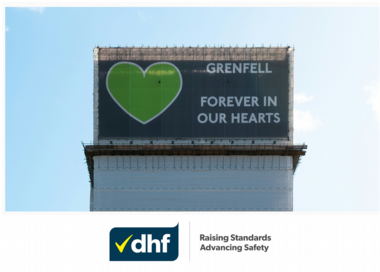
On the eighth anniversary of the Grenfell fire tragedy, which resulted in the loss of 72 lives, DHF is reflecting on a number of significant steps that have been taken in response to the findings of the Grenfell Tower Inquiry.
The fire, which took place on 14th June 2017 and rapidly engulfed a 24-storey residential building in North Kensington, exposed critical failings in building safety, regulation, and governance. In the years following the tragedy, a wide-ranging public inquiry, legislative reform, and a national reckoning with the responsibilities of those entrusted with public safety, have taken place.
On 4th September 2024, for example, the Grenfell Tower Inquiry released its final report, concluding that the fire resulted from "decades of failure" by the government and construction industry to address fire safety risks. The report includes58 recommendations aimed at preventing similar tragedies in the future.
In February 2025, the UK government published its response to the Inquiry's Phase 2 report, accepting the recommendations and outlining plans for their implementation. In May 2025, a progress report was released detailing steps taken, including the establishment of a publicly accessible record of recommendations from public inquiries.
Alongside its response, the government published a Construction Products Reform Green Paper, proposing comprehensive reforms to the construction products sector. Key proposals include expanding the regulatory scope to cover a broader range of construction products, establishing a national construction products regulator, enhancing oversight of product testing and certification processes, and introducing stricter enforcement mechanisms, including unlimited fines and potential prison sentences for non-compliance.
“A key area of reform since Grenfell has been improving the competence of those working in the built environment,” explains DHF’s Commercial Director, Patricia Sowsbery-Stevens. “Central to this is BS 8670-1:2024, a new standard developed by the British Standards Institution to define core principles, terminology, and requirements for competence in safety-critical roles. It serves as the foundation for role-specific competency frameworks across the industry, ensuring a shared understanding of responsibilities and expectations.
“DHF has played a key role in shaping the built environment’s evolving competence framework, contributing its expertise as a member of SLG 10 – Installation and Maintenance,” she continues. “This group focuses on addressing competence challenges within the installation and maintenance sector. Our involvement is identifying training gaps and defining the skills needed to meet the requirements of the Building Safety Act 2023, ensuring the sector is better prepared to deliver safe, compliant work in line with new regulatory expectations. We are also developing a Building Hardware Training Programme to provide a solid foundation in the fundamentals of building hardware, an initiative that supports the delivery of safer, more compliant building environments by ensuring workers are equipped with essential knowledge and skills.”
Join dhf
Enjoy the full benefits of dhf membership
Apply today